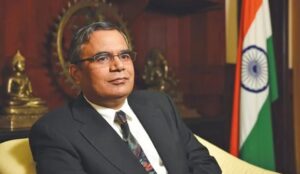 India has urged the Sri Lankan government to “work meaningfully” towards early implementation of its commitments to ensure fundamental freedoms and human rights of all its citizens, including Tamils, are fully protected.
India has urged the Sri Lankan government to “work meaningfully” towards early implementation of its commitments to ensure fundamental freedoms and human rights of all its citizens, including Tamils, are fully protected.
“As a close neighbour and friend of Sri Lanka, India has consistently supported Sri Lanka’s efforts towards relief, rehabilitation, resettlement and reconstruction process in Sri Lanka since 2009,” India’s Permanent Representative to the United Nations and Other International Organizations in Geneva Ambassador Indra Mani Pandey said on Monday.
India has always been guided by two fundamental principles of support to the aspirations of Tamils for equality, justice, dignity and peace; and unity, territorial integrity and sovereignty of Sri Lanka, Pandey said while speaking during the Interactive Dialogue on the Office of the United Nations High Commissioner for Human Rights (OHCHR) report on ‘Promoting reconciliation, accountability and human rights in Sri Lanka’ at the 54th Session of the Human Rights Council.
“We hope that the Government of Sri Lanka will fulfil the aspirations of Tamils for equality, justice and peace and its commitment to implement the 13th Amendment and conduct Provincial Council Elections to ensure a life of respect and dignity for Tamils in Sri Lanka,” he said.
The minority Tamil community in Sri Lanka has been demanding the implementation of the 13th Amendment that provides for devolution of power to it.
The 13th Amendment (13A) was brought in after the India-Sri Lanka agreement of 1987. It created 9 provinces as devolved units with a temporary merger of the Northern and Eastern provinces.
The elections for the nine provinces have been on hold since 2018 following a move to introduce electoral reforms. It now needs a parliamentary amendment to enable the elections to be held under the existing proportional representation system.
Pandey added that India has taken note of reaffirmation by the Government of Sri Lanka on the implementation of its commitments. “However, progress on the same is inadequate and we urge the Government of Sri Lanka to work meaningfully towards early implementation of its commitments to ensure that the fundamental freedoms and human rights of all its citizens are fully protected.” He told the Council that India has provided multi-pronged support, totalling more than USD four billion to Sri Lanka and its people, in the last year, to tide over its economic challenges.
During the visit of Sri Lankan President Ranil Wickremesinghe to India in July at the invitation of Prime Minister Narendra Modi, both leaders issued a Vision Statement on Connectivity which highlighted the significance of a strong India-Sri Lanka economic partnership for inclusive and sustainable growth in all regions and for all the people of Sri Lanka and for promoting reconciliation in the country, he said.
Pandey also expressed heartfelt condolences on the loss of thousands of lives in the recent earthquake in Morocco.
United Nations Deputy High Commissioner Nada Al-Nashif told the Council that one year after the “remarkable protest movement” demanding deep political and democratic reforms, the transformation that was hoped for to address long-standing challenges has still not materialised.
Sri Lanka continues to deal with the aftermath of the deep economic crisis of 2022 and the current stresses in the global economy. “Delays in holding local government elections and in reconstituting Provincial Councils under the 13th amendment have limited people’s right to political participation and the free expression of voters,” the official said.
Al-Nashif noted that 14 years after the war ended, tens of thousands of victims and their families continue to suffer in agony and grief as they await truth, justice and remedy.
The report recognizes the initiatives the Government has initiated to advance reconciliation, including its proposal for a new truth-seeking mechanism. “However, it also stresses that urgent confidence-building steps are needed to create an environment in which a genuine reconciliation and transitional justice processes could succeed,” Al-Nashif said.
The report recommends that the Sri Lankan Government accelerate investigations and prosecutions in emblematic cases of human rights violations, as well as the Easter Sunday bombings of April 2019, in compliance with international human rights standards. (PTI)


Post a Comment